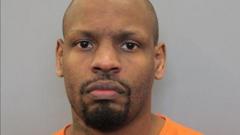Northern Ireland has experienced three consecutive nights of violent unrest linked to protests against immigration, triggered by the arrest of two boys charged with a serious crime. With reports of arson and clashes with law enforcement, the situation reflects deeper societal divisions exacerbated by social media rhetoric.
Anti-Immigrant Unrest Escalates in Northern Ireland, Resulting in Violence and Destruction

Anti-Immigrant Unrest Escalates in Northern Ireland, Resulting in Violence and Destruction
As violence spreads across Northern Ireland, police clash with rioters protesting against immigration policies, following a serious criminal incident.
Violence in Northern Ireland continues into its third consecutive night as rioters engaged in anti-immigrant demonstrations clash with police forces across the region. In Ballymena, where the unrest originated on Monday, masked protesters threw petrol bombs and bricks at law enforcement officers. Nearby, in Larne, groups set fire to a leisure center that was serving as emergency housing for families displaced from their homes amid the ongoing chaos. Authorities confirmed that these families were successfully relocated before the attacks took place.
The riots follow a reported hate crime in which two boys, aged 14, were charged with attempted sexual assault against a teenage girl in the vicinity of Clonavon Terrace on Saturday. The police described the subsequent violence as “hate-fueled,” with local law enforcement tracing the escalation to heightened tensions stirred by far-right and anti-immigration rhetoric on social media.
Northern Ireland’s power-sharing executive released a joint statement denouncing the “racially motivated violence” and emphasized the destructive impact of those exploiting the situation to incite division. As 32 police officers sustained injuries, the Police Service of Northern Ireland requested additional support from the wider UK, prompting the deployment of officers from Scotland to assist in maintaining order.
The turmoil began following the court appearance of the two teenagers, who communicated through a Romanian translator and denied the charges. As unrest spread from Ballymena to neighboring towns, tensions flared on the streets, leading to fierce confrontations with police donning riot gear. While the day ended with relative calm returning to Clonavon Terrace, demonstrations are projected to continue, with forecasts of severe weather likely altering the dynamics of the protest.
This escalating crisis highlights not only immediate responses to the incident but also underlying social issues within Northern Irish communities. The region's tumultuous history, coupled with contemporary concerns about immigration and societal cohesion, presents complex challenges for authorities as they strive to restore peace and address the root causes of the unrest.



















